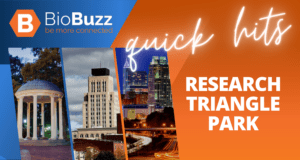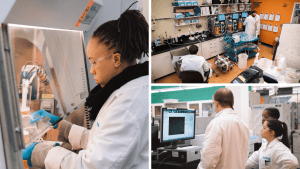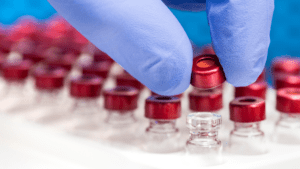
Accord BioPharma Eyes FDA Approval of Herceptin Biosimilar
By Alex Keown
April 6, 2023
Accord Biopharma is one step closer to securing regulatory approval for its breast cancer biosimilar, following the FDA’s acceptance of the Durham company’s Biologics License Application.
Accord developed HLX02 (a proposed trastuzumab biosimilar) for adjuvant treatment of HER2-overexpressing breast cancer. Additionally, HLX02 could be approved for the treatment of HER2-overexpressing metastatic breast cancer, and the treatment of HER2-overexpressing metastatic gastric or gastroesophageal junction adenocarcinoma – all indications for which Herceptin has received regulatory approval in the United States.
Chrys Kokino, president of U.S. Biopharma at Accord BioPharma, said the efficacy of HLX02 reference drug Herceptin is well documented. Approval of Accord’s biosimilar will provide HER2 cancer patients with a new treatment opportunity.
“Biosimilars are key to making healthcare more affordable and accessible. We’re working to develop the deepest portfolio of biosimilars to enhance the patient experience and improve the cost of care across the continuum,” Kokino said in a statement.
Biosimilars are biologic products that are highly similar to a branded drug, but are always uniquely different in composition. That differentiates biosimilars from generic drugs, which are exact chemical replicas of other drugs. Originally developed by Accord’s business partner Shanghai Henlius Biotech, HLX02 has been approved in multiple jurisdictions, including Europe and China. In 2021, Accord secured the right to develop and commercialize HLX02 in the U.S. and Canada.
Accord’s BLA is based on “robust structural and functional analytical comparison data” submitted by Accord BioPharma. That includes comparative analytical studies, nonclinical studies, a Phase I pharmacokinetic similarity study, as well as a global multicenter Phase III safety and efficacy trial. Data submitted to the FDA showed HLX02 and reference trastuzumab are highly similar in terms of quality, safety, and efficacy.
As of December 2022, the FDA has approved 40 biosimilar therapeutics. Biosimilar competition is fierce with multiple companies, including Maryland-based BioFactura and its Stellara biosimilar, fighting to bring biosimilar therapies to market in order to challenge traditional drugs manufactured by rival companies. In the U.S., there are several biosimilars to Herceptin that have been approved by the FDA, including Viatris’ Ogivri, Teva’s Herzuma, Pfizer’s Trazimera and Organon’s Ontruzant.
Biosimilar drugs have been widely available in Europe since 2006, but the U.S. Food and Drug Administration only granted the right to review and approve them when the Affordable Care Act was passed in 2010. The first biosimilar to receive approval in the United States was Sandoz’ Zarxio, which was approved in 2015. Zarxio is a biosimilar to Amgen’s Neupogen, a bone marrow stimulant for post-chemotherapy patients.
In addition to the Herceptin biosimilar, Accord BioPharma also commercializes prostate cancer treatment Camcevi, a 6-month subcutaneous depot formulation of leuprolide mesylate. Camcevi was initially developed by Taipei-based Foresee Pharmaceuticals. In 2022, Accord and Foresee entered into a commercialization partnership.
Following the BLA for HLX02, Accord BioPharma plans to introduce several additional biosimilars to the U.S. market in the next five years.







